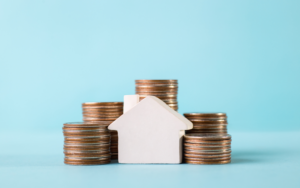Buying a home is likely to be the biggest financial decision you make and it is not one to make lightly. You may be under the impression that the only way to get onto the property ladder is by buying a home with another person, but this is not the case, it is possible to purchase a home on your own although the amount you can borrow may be less.
In this article, we explain whether a single person can get a mortgage, how much you can borrow to buy a house on your own and the things you should consider before buying a home on your own.
Can a single person get a mortgage?
Yes, it is possible to get a mortgage as a single person but you may have to prove to the lender that you are suitably able to afford the mortgage on your own. You will also need to consider the additional costs involved with purchasing a home such as solicitors fees, removal costs and stamp duty - if applicable. If you are unsure if you are able to get a mortgage on your own, you may wish to speak to a mortgage broker* who will be able to assess your finances and provide independent advice, including the options available to you.
Can I get a mortgage on my own if I am self-employed?
It is possible to get a mortgage if you are buying a home on your own and you are self-employed but a lender will typically ask for up to 3 years' history of your accounts, although this does vary depending on the lender. Being self-employed will usually mean that lenders see you as a higher risk than those employed with a guaranteed monthly income. As a result, it would be a good idea to provide lenders with as much information as possible to prove you are comfortably able to afford a mortgage on your own.
Can I get a mortgage on my own if my partner has bad credit?
If you are hoping to buy a property but you are worried that your partner's poor credit history will affect the application, you may consider buying a home as a sole owner. This is possible, however, it can make the mortgage application more difficult, particularly if you and your partner are married as some lenders prefer married couples to have joint mortgages. Taking out a mortgage in your name only can also affect your borrowing power as only your income will be considered when applying for the mortgage, which in turn, will mean that you are able to borrow less than if two incomes were considered. Speaking to an independent mortgage broker* is a good idea if you are looking for guidance when applying for a mortgage.
If you are financially linked to your partner via a joint bank account, their credit history will still be considered in your mortgage application.
How much can a single person borrow for a mortgage?
How much you will be able to borrow when buying a home will vary depending on the lender as each has different affordability criteria when deciding whether they can lend. As a general rule, lenders are likely to lend 3-5 times your income and whether this can be topped up with overtime or additional sources of income will be on an individual lender basis. Having a mortgage broker* can be useful as they are likely to know which lenders have better options for sole homeowners and can help you to find the best deals for your situation.
When borrowing money for a mortgage for a house purchase, it is also important to consider your affordability as this will be a large factor in whether a lender decides to lend to you or not. You will also need to consider the amount of deposit you will need, whether you have any outstanding debt and also your monthly outgoings. Now is a good time to consider reducing your outgoings and checking your credit score to ensure you are as attractive to lenders as possible.
How much does it cost to own a home as a single person?
Buying a home is a big financial expense and so it is wise to know all of the costs before committing to buying a home. Below we list some of the key things to consider when buying a home but additional information can be found in our first-time buyer guide and our article, 'How much does it cost to buy a house?'
- Deposit - One of the biggest expenses when buying a home is the deposit which is a percentage of the purchase price of the property, payable when you exchange contracts. If you are buying a home on your own this deposit may need to be higher as you are unable to borrow as much as if you were buying a home jointly. Having a higher deposit will also decrease your LTV and so can make you more attractive to lenders.
- Mortgage broker fees - Some mortgage brokers charge a fee for their advice. Shop around when looking for mortgage brokers as not all charge a fee. Take a look at our review of Habito, an independent online mortgage broker that does not charge a fee. If you are unsure where to look for a mortgage broker, VouchedFor* can help you find independent local mortgage advisers.
- Lender fees - Some lenders will charge a fee for valuing the property that you are purchasing. The amount varies depending on the lender but the amount is usually required upfront. Additionally, when taking out a mortgage you may be charged a lender fee for a mortgage deal with a more favourable rate, this fee can be added to the mortgage amount rather than an upfront cost but remember that it will attract interest.
- Conveyancing fees - You will have to pay legal fees to a conveyancer for managing the purchase of the property. This is likely to be one of the largest fees payable in the house-buying process but the cost can vary depending on the solicitor.
- Stamp duty - If you are a first-time buyer you will not have to pay stamp duty on properties up to £425,000 in value. If you have previously owned a home, you will need to factor in the cost of stamp duty when buying a home. Our guide explains everything you need to know about stamp duty or you can use this handy calculator to work out how much you will need to pay.
- Moving home costs - You will also need to consider removal costs as well as the cost of any storage units if you need to store larger items while you move.
- Bills - Finally, you should consider how much it will cost you to live each month once you have moved. You will need to consider the cost of all of your household bills in addition to your mortgage payment. If you are a single occupant you may be entitled to a council tax reduction and you may be able to save money on your water bill with a water meter.
Things to consider before buying a home on your own
Before buying a home on your own there are a few things that you should take into consideration which we list below.
Research
Before buying a home you should thoroughly research the areas in which you would like to live to understand properties that are within your affordability range. There are a number of calculators that can give a rough idea of how much you are able to borrow before you apply for a mortgage and this can help you to find out properties and areas that fall within your price range.
Affordability
Another key thing to consider before buying a home is your affordability. This is when the lender assesses your ability to afford the mortgage based on your income and your outgoings. This is something to consider before applying for a mortgage. It can be a good idea to create a budget so that you can see exactly where your money goes each month and if there is anywhere you can cut back to increase your affordability and attractiveness to lenders.
Credit score
Your creditworthiness will be considered by your lender when it comes to purchasing your home and so you will need to ensure that you have a good credit record. Credit reference agencies such as Experian, Equifax and Transunion assess your creditworthiness by giving you a credit score and the score can be different depending on which credit agency you check. Make sure that you check your credit score with each credit agency before applying for a mortgage as a credit rejection can negatively impact your credit score. If you have never checked your credit score before, there are a number of ways in which you can check your credit score for free.
Save a large deposit
Buying a home on your own can be difficult as there is only one income that the lender can consider when assessing how much you can borrow. One way of increasing your affordability and the amount you can borrow is by saving a larger deposit which will help to reduce the Loan to Value (LTV) on the property. Lifetime ISAs are a great way to save for your first home and you can also benefit from a 20% government bonus which can top up your deposit. Savings apps can also help you to maximise your savings by allowing you to save as you spend.
Government schemes
Before purchasing a property you should check to see if there are any government schemes that can help you get on the property ladder. These schemes, such as the Shared Ownership scheme, can also be particularly helpful if you are looking to buy a home on your own as you can buy a percentage of the property and rent the remainder meaning you will only require a smaller mortgage and deposit. The Lifetime ISA can also allow future homeowners to benefit from a £1,000 government bonus but the account has to be open for a minimum of 12 months prior to purchasing your first home.
It is worth considering that most of these schemes are available for first-time buyers only and if you have previously owned a property in the UK or abroad you are unlikely to be considered a first-time buyer.
Stamp duty
If you are buying a home for the first time you will not have to pay stamp duty on properties up to the value of £425,000. If you have previously owned a home and are now looking to buy a home as a sole homeowner you will need to consider the amount of stamp duty payable and factor this into your costs when working out your affordability.
Circumstantial changes
Before committing to buying a home on your own you should also consider if you are likely to have any changes in your circumstances in the near future that could affect your ability to afford a mortgage or change your status as a single-person homeowner. Examples of things to consider include:
- Whether you are planning on getting married
- If you are hoping to have children, are pregnant or are on maternity leave
- Are you planning to change jobs or start your own business
- Will you want to add someone to your mortgage at a later date or would you like to protect the assets that you own?
Pros and cons of buying a home on your own
Pros
- You have more stability than renting and don't have to worry about rent increases
- You can make amendments to your property without having to check with your landlord
- You have the potential to build equity in your home
Cons
- Having a single-person mortgage can reduce how much you can borrow
- It can be harder to manage your mortgage payments on one income
- Owning a home is less flexible than renting if you need to move or can no longer afford your mortgage payments
How to apply for a mortgage on your own
Applying for a mortgage as a single homeowner is much the same as applying for a joint mortgage. If you already have a property in mind, then you should obtain a decision in principle from your lender. When applying for a decision in principle you will need to provide bank statement history to prove your income and affordability, usually, lenders ask for around 3 months and so it is a good idea to ensure you have cleared any debt prior to applying for a mortgage.
A mortgage broker* can offer help and guidance when buying a home on your own and will be able to recommend more favourable mortgage deals based on your personal circumstances. It is possible to speak to a mortgage broker such as Habito* for free, receiving a fee for their services from the lender once the mortgage deal has gone through. Mortgage brokers can also advise on the best type of mortgage for your situation and arrange most of the mortgage application on your behalf.
Can I add a partner to my mortgage?
If you are a sole homeowner and in a relationship, you may decide to add your partner to your mortgage. There are two different ways that another person can be added to a mortgage; as a joint tenant or as tenants in common. Choosing to add another person as a tenant in common means that you can choose what percentage of the property each person owns while adding an individual as a joint tenant means that each person owns 50% of the property, regardless of how much each person has contributed. You may wish to speak to a solicitor before choosing to add another person to your mortgage as doing so can affect the person's legal claim to the property.
There are benefits of adding another person to the mortgage as it can help to reduce the financial burden on mortgage payments and can help reduce your risk to lenders as there will be another income to consider. If you choose to add someone to your mortgage you will need to contact your lender and the person will have to undergo affordability and credit checks before the lender agrees to add them to the mortgage. When adding an additional person to the mortgage you will also need to consider that you both become liable for the mortgage payments and you will become financially linked, if you are not already. If you decide that you are not quite ready for someone to be added to your mortgage, you can ask them to move in instead and add them to the mortgage when you feel comfortable.
Remortgaging a single person mortgage
Remortgaging as a sole property owner is the same as remortgaging as a joint owner. If you choose a product transfer when it is time to remortgage, you will not have to provide much information to the lender as your affordability has already been assessed when you took the original mortgage out.
If you are remortgaging to another lender you may have to provide bank statements and undertake additional affordability checks so that the lender you are switching to can be confident that you are able to keep up with your mortgage repayments. Additional information on remortgaging and the best time to do it can be found in our article, 'Remortgaging in 2023 - is now the right time to fix and for how long?' If you are worried about the fluctuations in interest rates, bookmark our interest rate predictions article for the most up-to-date information on interest rates and how it affects your mortgage.
What to do if you cannot afford your mortgage
If you are unable to afford your mortgage as a sole homeowner the first thing you should do is contact your lender to notify them of your financial situation. Most lenders have specialist teams on hand to help those facing financial hardship and are likely to be able to accommodate your needs. It is best to do this before you get into financial difficulty and you may find that you have more options available to you. There are also a number of websites and charities that offer free debt help and advice if you find you are struggling financially. Our cost of living guide and household money-saving tips also offer additional information on the help that may be available to you.
If a link has an * beside it this means that it is an affiliated link. If you go via the link, Money to the Masses may receive a small fee which helps keep Money to the Masses free to use. The following link can be used if you do not wish to help Money to the Masses or take advantage of any exclusive offers - Habito, Vouchedfor






